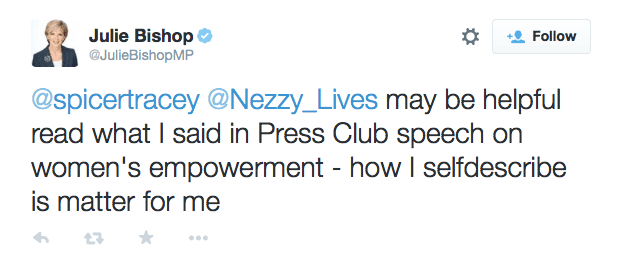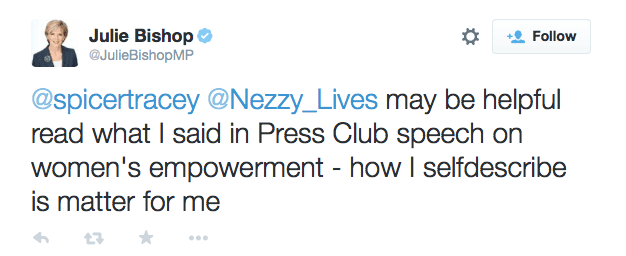It was bound to happen; when there is only one it is inevitable. Julie Bishop, the lone female representative in Cabinet, has been everywhere lately and her comments around and about women in particular have been dissected within an inch of their life. I am one, of the many, who has done some dissecting.
This focus was always going to end in a fight of sorts; the pressure is such that it’s inescapable. How can one woman adequately champion the agenda of all women? She can’t, no one can. But with no one else to turn to, upon whom else can we pin our hopes? There is no one.
So a fight ensues and whilst it might be a worthy fight it’s not the main event. It’s not the big battle. It’s a smaller side event and it distracts from the big battle. And worse, it lets everyone else off the hook. Look at those women fight! They’re their own worst enemies! Honestly! You wonder why women aren’t equal, it’s because they’re so petty that they constantly fight with one another!
Wrong. We fight because we want an even piece of the pie and we will argue men and women on that point. It’s easier, however, for those fights to be dismissed as infighting rather than recognising the legitimate point of contention. And so I fear will happen between Julie Bishop and Tracey Spicer.
Last night on Twitter the foreign minister responded to a fiery riposte Tracey Spicer wrote about Bishop’s comment that women should “stop whingeing”. In the column in question Spicer explained, with characteristic humour and insight, how patronising, insulting and futile it is to tell less powerful groups to stop complaining. (And it is.)
And I fear it is too easy to continue to ignore. The real point of contention is not between Tracey Spicer and Julie Bishop. It cannot effectively be reduced to one woman against another; the real issue is far bigger and more complex than that.
The real issue is this: Australia is legitimately failing to engage women on equal terms. The pay gap is growing. The wealth disparity between men and women is growing. Discrimination against women is increasing. Our workforce participation is going backwards. The political empowerment of women is dropping. These are facts; they are not my opinions.
The most pressing question, or the big battle if you will, is what are we going to do about it? Regardless of whether you call yourself a feminist, or whether you’re a man or a woman, that is the question I want answered. Julie Bishop is not the only powerful person in Australia whose answer I would like to that question but she is one. Telling women to stop whingeing is hardly a constructive starting point.
Is there anyone in power who has a legitimate answer to this question? Because, from where I stand, it seems to me the question isn’t even being considered and that is as troubling as the problem itself.

